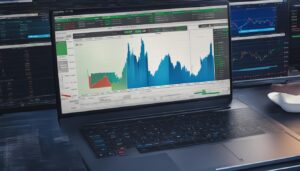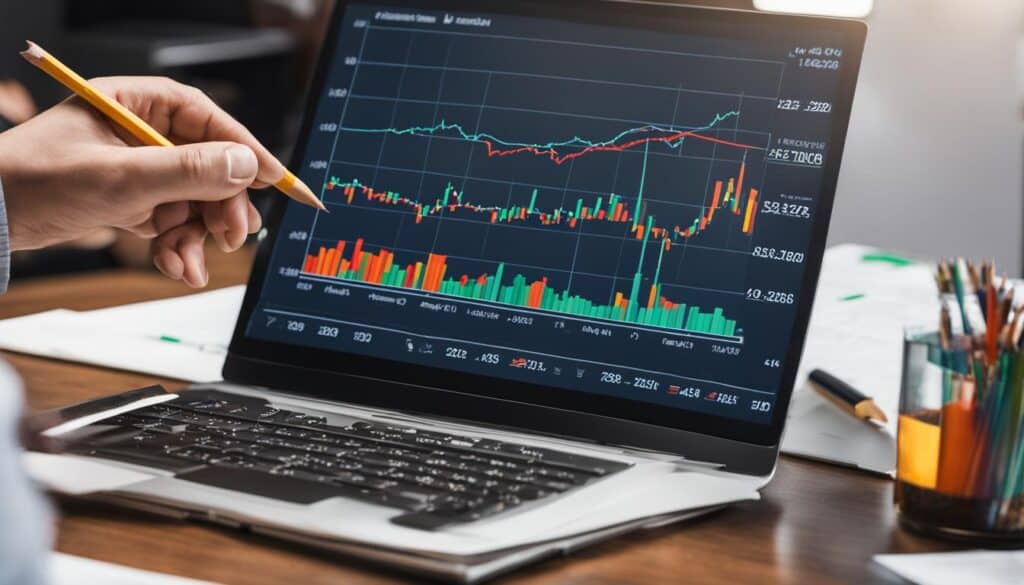In the fast-paced world of Forex trading, beginners often find it challenging to navigate the intricacies of the financial markets. However, with the advent of demo accounts, aspiring traders now have a powerful tool at their disposal to enhance their trading skills and gain valuable experience.
A demo account is a simulated trading environment that mimics the real market conditions but utilizes virtual capital. It enables beginners to practice trading without the risk of losing real money. By utilizing demo accounts, aspiring traders can learn the ropes, test new strategies, and build confidence without the fear of financial loss.
Key Takeaways:
- Demo accounts provide beginners with a risk-free environment to practice trading skills.
- Virtual capital in demo accounts eliminates the fear of financial loss for beginners.
- Using demo accounts, beginners can test and refine their trading strategies without real monetary consequences.
- Demo accounts help beginners build confidence and gain familiarity with the Forex market.
- By utilizing demo accounts, beginners can prepare themselves for live trading in a controlled environment.
The Significance of Demo Accounts in Practicing and Testing Trading Strategies
Before diving into the world of trading, it is crucial to understand the importance of demo accounts and how they can significantly impact your trading journey. Demo accounts provide traders with a unique opportunity to practice and test trading strategies without risking real funds. They serve as a virtual sandbox, allowing traders to gain experience, refine their techniques, and boost their confidence in a risk-free environment.
One of the key advantages of demo accounts is that they provide traders with virtual capital. This eliminates the fear of losing real money during the learning phase and allows traders to freely experiment with different trading strategies. Whether you are a beginner or an experienced trader, demo accounts provide a safe space to refine your skills and explore new approaches.
“Demo accounts serve as a foundation for traders to build their expertise and develop a deep understanding of the financial markets.”
Another significant benefit of demo accounts is the ability to avoid delays or slippage in executing positions. Unlike live trading where delays in order execution can occur due to market volatility, demo accounts offer immediate execution that allows traders to focus solely on testing their strategies.
Furthermore, demo accounts provide traders with fixed and tight spreads. This means that traders can practice their trading approaches without the constant spread fluctuations experienced in real market conditions. Having consistent spreads allows traders to better analyze the impact of their strategies on their trading results.
The significance of demo accounts in practicing and testing trading strategies cannot be overstated. It enhances traders’ learning experience, builds confidence, and fosters a deeper understanding of the intricacies of the financial markets. By utilizing demo accounts effectively, traders can fine-tune their strategies, identify strengths and weaknesses, and ultimately improve their trading performance.
Example Trading Strategy Test Results:
| Trading Strategy | Number of Trades | Win Rate | Average Profit/Loss |
|---|---|---|---|
| Strategy A | 50 | 60% | $100 |
| Strategy B | 75 | 70% | $150 |
| Strategy C | 30 | 80% | $200 |
The table above showcases the results of testing different trading strategies using a demo account. It is evident that each strategy has its own performance metrics, and traders can use the data to evaluate which strategies align with their goals and risk tolerance.
Overall, demo accounts play a crucial role in the development of trading skills and the testing of strategies. By harnessing the power of demo accounts, traders can gain valuable insights, make informed decisions, and ultimately improve their trading performance when they transition to live trading.
Why Professionals Use Demo Accounts and When They Are Useful
As professionals in the trading industry, we understand the value of demo accounts in developing and refining our trading strategies. These virtual accounts provide a risk-free environment that allows us to explore, improve, and even change our approach to trading. By incorporating demo accounts into our trading routine, we can leverage virtual funds to test various strategies without the fear of losing real money.
Demo accounts also offer a safe space for us to reset our trading psychology and rebuild discipline. We can experiment with different trading styles, analyze market trends, and learn from past mistakes without any actual financial consequences. This helps us maintain a clear mindset and make rational decisions when it comes to live trading.
In addition to strategy development, professionals often use demo accounts to test new tools and robots. These accounts serve as a sandbox for evaluating the functionality and performance of these technologies before risking our actual deposits. It allows us to gauge how well these tools align with our trading objectives and helps us make informed decisions about incorporating them into our trading strategies.
Using demo accounts as professionals is not just about honing our skills; it’s about leveraging a risk-free environment to experiment, learn, and adapt.
In summary, demo accounts are an invaluable resource for professionals seeking to enhance their trading abilities. They enable us to develop and test strategies, reset our trading psychology, and evaluate new trading tools. By utilizing demo accounts effectively, professionals can stay ahead of the market and make more informed decisions when it comes to live trading.
Drawbacks of Demo Trading
While demo accounts offer significant benefits, it’s important to consider the drawbacks that come with demo trading. These drawbacks can affect traders’ overall experience and their ability to develop important trading skills.
Lack of Emotional Involvement
One of the major drawbacks of demo trading is the absence of real emotions that traders experience when real money is at stake. Without the emotional involvement, traders may develop a false sense of confidence and unrealistic perceptions of success. It’s crucial for traders to understand that trading with real money involves managing emotions, such as fear and greed, which can impact decision-making.
Ignorance of Risk Management
Another drawback of demo accounts is the tendency to neglect the importance of risk management. In demo trading, traders are shielded from potential events that can significantly impact the market. As a result, they may not develop a proper understanding of risk management techniques and fail to apply them when they transition to live trading. Effective risk management is essential for minimizing losses and preserving capital.
Immediate Order Executions
One of the challenges in real trading is the execution of orders, which can involve requotes, slippage, and other execution challenges. However, demo accounts often provide immediate order executions without these obstacles. This can give traders a false sense of security and fail to prepare them for the execution challenges they may face in live trading situations.
It’s important for traders using demo accounts to be aware of these drawbacks and take proactive steps to address them. By recognizing the limitations of demo trading, traders can develop a more realistic approach to their trading education and ensure a smoother transition to live trading when they are ready.
| Drawbacks of Demo Trading |
|---|
| Lack of emotional involvement |
| Ignorance of risk management |
| Immediate order executions |
Enhancing the Realism of Demo Trading
To enhance the realism of demo trading, it is crucial for traders to treat their demo accounts as if they were trading with real money. By adopting this mindset, traders can better simulate the actual trading experience and develop the skills necessary for successful trading in live markets.
One important aspect of treating demo accounts as real is taking the practice seriously. Traders should approach their demo trading sessions with the same level of focus and dedication they would employ in a live trading environment. By treating each trade as if real money is at stake, traders can develop the discipline and mental fortitude necessary for consistent trading success.
Cultivating discipline is another key element in enhancing the realism of demo trading. Traders should adhere to their trading plans, follow risk management strategies, and avoid impulsive decisions. By practicing discipline in demo accounts, traders can build the self-control necessary to make rational and informed trading decisions when real money is on the line.
Working with a similar deposit size in demo accounts also contributes to the overall realism of the trading experience. By matching the deposit size to what traders would have in a real account, they can accurately assess the impact of trading decisions on their portfolio. This approach allows traders to gain a true understanding of the potential risks and rewards associated with their trading strategies.
In addition to these practices, it is essential for traders to track their trading performance in demo accounts. By analyzing their trades, identifying strengths and weaknesses, and making necessary adjustments, traders can continually improve their trading strategies. This process of self-reflection and learning is crucial for growth and development as a trader.
Ultimately, demo accounts serve as a valuable learning tool for traders to enhance their skills and refine their strategies. By treating these accounts as if they were real, cultivating discipline, and working with a similar deposit size, traders can bridge the gap between demo trading and live trading, ensuring a smoother transition and increasing their chances of success in the financial markets.
“Demo trading should not be viewed as a game or a casual exercise. Treating demo accounts as real is the key to developing the necessary skills and mindset for successful trading in live markets.”
Conclusion
In conclusion, forex trading demo accounts are a vital asset for both beginners and professionals looking to enhance their trading skills and boost their confidence. These demo accounts offer a risk-free platform for traders to practice and refine their trading strategies without the fear of losing real money. By utilizing demo accounts, traders can gain valuable experience in a simulated market environment, allowing them to explore different approaches and techniques.
For beginners, demo accounts provide an excellent opportunity to learn the basics of forex trading and understand the intricacies of the financial markets. Through hands-on experience, they can become familiar with the trading platform, study various chart patterns, and gain insights into market trends. This invaluable learning experience helps beginners build a strong foundation and develop effective trading strategies.
Moreover, demo accounts serve as a valuable tool for professionals to fine-tune their trading approaches and test new strategies. By simulating real market conditions, professionals can evaluate the effectiveness of different techniques and identify any weaknesses or areas for improvement. In essence, demo accounts allow professionals to stay ahead of the curve and adapt their trading strategies to the ever-changing market dynamics.
In summary, forex trading demo accounts are an indispensable resource for traders at all skill levels. They provide a risk-free environment for beginners to learn and grow, while also empowering professionals to enhance their trading skills. By utilizing demo accounts effectively, traders can gain the confidence and expertise needed to succeed in the challenging world of forex trading.
FAQ
What is a demo account?
A demo account is a tool that provides traders with the opportunity to practice trading in simulated market conditions using virtual capital and real-time price data without risking real funds.
How does a demo account benefit traders?
Demo accounts offer traders a risk-free environment to learn the market, test new strategies, and gain confidence. They also provide virtual capital, fixed spreads, and tight spreads, allowing traders to refine their trading approaches without the volatility of real market conditions.
Why do professionals use demo accounts?
Professionals use demo accounts to develop and test trading strategies, explore new tools and robots, reset their trading psychology, and evaluate the functionality and performance of various technologies without risking their deposits.
What are the drawbacks of demo trading?
One drawback is the lack of emotional involvement, which can lead to overconfidence and unrealistic perceptions of success. Demo accounts also tend to ignore the importance of risk management and provide immediate order executions, unlike the potential challenges faced in live trading situations.
How can traders enhance the realism of demo trading?
Traders can treat demo accounts as if they were trading with real money by taking the practice seriously, cultivating discipline, working with a similar deposit size, tracking their trading performance, and using demo accounts as a learning tool to improve their strategies and risk management skills.
Source Links
- https://fastercapital.com/content/Exploring-Demo-Account-Benefits–Sharpen-Your-Trading-Skills-Risk-Free.html
- https://fbs.eu/en/blog/the-role-of-demo-accounts-in-practicing-and-testing-trading-strategies-536
- https://www.linkedin.com/pulse/how-use-forex-demo-account-tera-jon-yi7rc?trk=article-ssr-frontend-pulse_more-articles_related-content-card
Disclaimer
All information on this website is of a general nature. The information is not adapted to conditions that are specific to your person or entity. The information provided can not be considered as personal, professional or legal advice or investment advice to the user.
This website and all information is intended for educational purposes only and does not give financial advice. Signal Mastermind Signals is not a service to provide legal and financial advice; any information provided here is only the personal opinion of the author (not advice or financial advice in any sense, and in the sense of any act, ordinance or law of any country) and must not be used for financial activities. Signal Mastermind Signals does not offer, operate or provide financial, brokerage, commercial or investment services and is not a financial advisor. Rather, Signal Mastermind Signals is an educational site and a platform for exchanging Forex information. Whenever information is disclosed, whether express or implied, about profit or revenue, it is not a guarantee. No method or trading system ensures that it will generate a profit, so always remember that trade can lead to a loss. Trading responsibility, whether resulting in profits or losses, is yours and you must agree not to hold Signal Mastermind Signals or other information providers that are responsible in any way whatsoever. The use of the system means that the user accepts Disclaimer and Terms of Use.
Signal Mastermind Signals is not represented as a registered investment consultant or brokerage dealer nor offers to buy or sell any of the financial instruments mentioned in the service offered.
While Signal Mastermind Signals believes that the content provided is accurate, there are no explicit or implied warranties of accuracy. The information provided is believed to be reliable; Signal Mastermind Signals does not guarantee the accuracy or completeness of the information provided. Third parties refer to Signal Mastermind Signals to provide technology and information if a third party fails, and then there is a risk that the information may be delayed or not delivered at all.
All information and comments contained on this website, including but not limited to, opinions, analyzes, news, prices, research, and general, do not constitute investment advice or an invitation to buy or sell any type of instrument. Signal Mastermind Signals assumes no responsibility for any loss or damage that may result, directly or indirectly, from the use or dependence on such information.
All information contained on this web site is a personal opinion or belief of the author. None of these data is a recommendation or financial advice in any sense, also within the meaning of any commercial act or law. Writers, publishers and affiliates of Signal Mastermind Signals are not responsible for your trading in any way.
The information and opinions contained in the site are provided for information only and for educational reasons, should never be considered as direct or indirect advice to open a trading account and / or invest money in Forex trading with any Forex company . Signal Mastermind Signals assumes no responsibility for any decisions taken by the user to create a merchant account with any of the brokers listed on this website. Anyone who decides to set up a trading account or use the services, free of charge or paid, to any of the Broker companies mentioned on this website, bears full responsibility for their actions.
Any institution that offers a service and is listed on this website, including forex brokers, financial companies and other institutions, is present only for informational purposes. All ratings, ratings, banners, reviews, or other information found for any of the above-mentioned institutions are provided in a strictly objective manner and according to the best possible reflection of the materials on the official website of the company.
Forex/CFD trading is potentially high risk and may not be suitable for all investors. The high level of leverage can work both for and against traders. Before each Forex/CFD investment, you should carefully consider your goals, past experience and risk level. The opinions and data contained on this site should not be considered as suggestions or advice for the sale or purchase of currency or other instruments. Past results do not show or guarantee future results.
Neither Signal Mastermind Signals nor its affiliates ensure the accuracy of the content provided on this Site. You explicitly agree that viewing, visiting or using this website is at your own risk.




